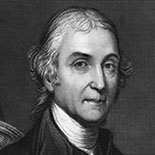 Joseph Priestley (March 24, 1733 – February 6, 1804) was an 18th-century English theologian and chemist.
Joseph Priestley (March 24, 1733 – February 6, 1804) was an 18th-century English theologian and chemist.
He was also a Dissenting clergyman, natural philosopher, chemist, educator, and political theorist who published over 150 works. Priestley is usually credited with the discovery of oxygen, although Carl Wilhelm Scheele and Antoine Lavoisier also have a claim to the discovery.
During his lifetime, Priestley’s considerable scientific reputation rested on his invention of soda water, his writings on electricity, and his discovery of several “airs” (gases), the most famous being what Priestley dubbed “dephlogisticated air” (oxygen). However, Priestley’s determination to defend phlogiston theory and to reject what would become the chemical revolution eventually left him isolated within the scientific community.
Priestley’s science was integral to his theology, and he consistently tried to fuse Enlightenment rationalism with Christian theism. In his metaphysical texts, Priestley attempted to combine theism, materialism, and determinism, a project that has been called “audacious and original”. He believed that a proper understanding of the natural world would promote human progress and eventually bring about the Christian Millennium. Priestley, who strongly believed in the free and open exchange of ideas, advocated toleration and equal rights for religious Dissenters, which also led him to help found Unitarianism in England. The controversial nature of Priestley’s publications combined with his outspoken support of the French Revolution aroused public and governmental suspicion; he was eventually forced to flee, in 1791, first to London, and then to the United States, after a mob burned down his home and church. He spent the last ten years of his life living in Northumberland County, Pennsylvania.
A scholar and teacher throughout his life, Priestley also made significant contributions to pedagogy, including the publication of a seminal work on English grammar, books on history, and he prepared some of the most influential early timelines. These educational writings were some of Priestley’s most popular works. It was his metaphysical works, however, that had the most lasting influence: leading philosophers including Jeremy Bentham, John Stuart Mill, and Herbert Spencer credit them among the primary sources for utilitarianism.